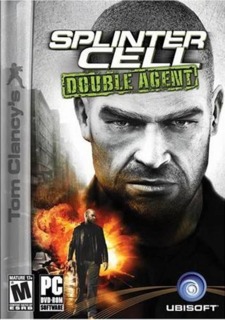Double Agent brings a reinvigorating twist to the branded Splinter Cell gameplay, yet lacks the impact of the original.
Staying in tune with the other Splinter Cell games, Double Agent doesn't depart all that much from the tried-and-true formula of skulking in the shadows to kill or evade opposition. The most important addition to the way Splinter Cell usually plays is the introduction of the undercover concept, which will basically have you complete a number of objectives for and against your two contractors (the NSA on one side and the terrorist cell on the other), in a set amount of time that will usually be too short for you to complete everything. Therefore, you are supposed to choose, implicitly impacting the level of trust each one of the two organizations has in you. Moreover, quite a few objectives, both in-mission and at the terrorist headquarters will conflict with one another, forcing you to decide between double-crossing the terrorists, or double-double-crossing the NSA. This lends a somewhat schizophrenic feel to the entire game, as you get tugged between your covert assignment and genuinely helping the bad guys.
Apart from the whole undercover operative game mechanic, the "What's New" department holds a couple of new moves, a number of gadgets, Nokia cell phones and a Nivea banner. In a move towards the Hitman series, Double Agent features a mission review, where, along with completed objectives and unlockables screens, there's a detailed stealth score based on your actions, such as number of kills, times identified as intruder, and so on. Unfortunately, this stealth score has no real in-game impact, as in Hitman, but is there for informational purposes only, which makes it a more-or-less pointless feature.
Another misstep is the handling of the two-agent mode, which doesn't really allow you to coordinate with your AI side-kick, instead has him lead the way pretty much independently of your actions. There's no satisfaction involved, and it rather feels like having a mosquito buzzing around your ears while you're trying to get the job done – definitely a long way away from the teamwork in multiplayer. It's actually enough to make one thankful there are only about 10 minutes in the entire single player portion of the game that keep you playing with an AI ally.
The game story starts out in an uninspired manner, compressing a lot of information in the intro scene, and providing an inopportune and fairly cliche premise. Past this introduction, the storytelling element gets better, driving the action at a steady pace, and even if you are kept in the dark regarding a lot of what's happening in the background, more than a few things transpire from overheard dialogue, decrypted e-mails, orders, and the like. There's a lot of freedom to influence the path of the story, leading to one of three possible endings, each one a reflection of the moral choices you've taken in the game and the standing you have with your two employers.
On the graphics side, Double Agent really shines, no pun intended, thanks to the integration of Unreal Engine III. The bump-mapped models hold tons of detail, and the lighting is quite realistic, if a bit too bright in the supposedly dark areas of the single player campaign. Dynamic shadows have arguably the worst implementation to date, as they tend to get distorted around the edges and shake a lot. There are some technical bugs as well, such as all-black objects and character models, but that seems to depend on the PC configuration. Nevertheless, the game is really scalable, and could even pull off a consistent framerate on a Geforce 6600 GT, at 800x600 with all the details maxed out.
In-game sound effects, while not being sub-par, don't impress, or even stand out for that matter. The game is generally quiet, yet you can hear your footsteps loud and clear while you're running around at the back of an oblivious enemy. Music, however, is really atmospheric, and features a different theme for each mission, based on the locale it takes place in. The whole spectrum is there, from low-key electronic music to tribal rhythms and African chants, each musical backdrop adapting to your actions.
You'll want to play Splinter Cell 4 single player at least twice, to experience the different outcomes of your actions, while the multiplayer experience is one of the most intense ones I've had, even though there's a maximum of 6 players in-game. The game's difficulty is quite high even in single player, if you don't know what to do, and having human opponents increases that difficulty exponentially, so this is the game of choice for LAN parties in your home. There are even some rewards for continuously playing the game, such as new clothing for your characters, and new maps being unlocked.
The bottom line is that Splinter Cell: Double Agent is a great addition to the series, and a recommended pick for anybody enjoying the stealth shooter genre. There's a first-rate story to play through on your own, and memorable moments to share with your friend in multiplayer which add up to a well-spent 30-or-so dollars.

